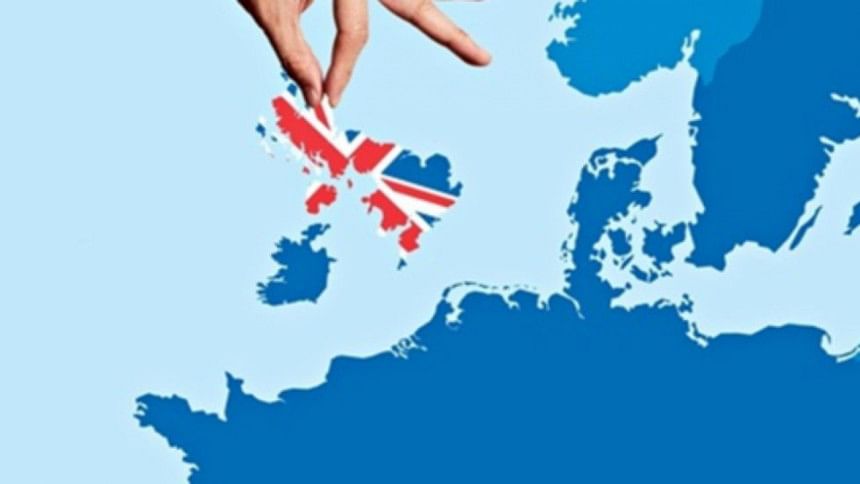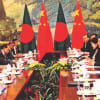'BREXIT' means uncertainty

On June 23, the UK electorate surprised itself by voting 52 percent: 48 percent to leave the EU, after 40 years of membership. Warnings of experts of economic damage had been defeated by populist emotion.
The referendum revealed a bitter resentment of metropolitan elites equipped with education, wealth and connections to make them better able to adapt and thrive in an era of globalisation and technological change. Only London, some prosperous regional cities, Scotland and Northern Ireland voted to 'remain' in the EU. Scotland preferred rule from Brussels to rule from Westminster, even after devolution of powers to their own parliamentary assembly.
Prime Minister Cameron resigned and his successor, Theresa May, the former Home Secretary, promptly sacked the Chancellor of the Exchequer, George Osborne. Mrs. May had quietly supported the 'remain' camp but now gave three prominent persons 'leavers', who voted to leave the EU responsibility for devising a road map out of the EU. The Governor of the Bank of England lowered interest rates to try to cushion the expected economic shock. The pound sterling dropped 12 percent and stock markets across the world reacted badly to the new uncertainty: what would Brexit mean, for the UK and for the already shaky EU?
Two and a half months later, the UK markets have recovered. Consumers have realised that Britain is still in the EU for at least two years. They have continued to spend and exports have taken advantage of the sterling's fall. The 'leavers' have taken this as evidence that the Cameron government's warnings of economic damage were exaggerated. They claim new trading opportunities will open across the world once the UK is free of the 'burdens' of EU's bureaucratic regulation. Nigel Lawson, Chancellor under Mrs. Thatcher, calls for a completion of her 1980s economic revolution through deregulation.
The 'remainers' acknowledge that the economy has recovered from the initial shock better than some expected. They point out that leaving the EU will take years of negotiation, even after Britain has formally started the process by invoking Article 50 of the Lisbon treaty. They warn that the adverse economic consequences of Brexit will gradually emerge. The devaluation of the sterling is likely to raise import prices. Moreover, uncertainty as to the form Brexit might take, particularly as regards to the degree of UK continued access to the EU single market and customs union of 450 million people is likely to hit both domestic and foreign investment. Negotiation regarding the terms and conditions of such access could well be difficult and could only fully begin after the transitional terms of UK withdrawal had been agreed.
The 'leavers' say that Britain should accept trading on World Trade Organisation (WTO) terms, including tariffs. The 'remainers' point out that even this would need a decade of negotiating with all WTO members. President Obama and Japanese Prime Minister Abe have both issued their own warnings.
The UK has grown accustomed to foreign firms and banks setting up in Britain, especially in London, as a convenient base not only for investment in the domestic market but for operations throughout the EU. Strong inflows of foreign capital have been important in helping to sustain the UK's capital account deficit. The 'City' is the financial centre and provides a key element of UK government revenues. It has formidable strengths, but could still be weakened if foreign banks lose EU 'passporting' rights and cease to use the 'City' as a base for European operations.
At the Hangzhou G20 summit meeting and the following UN General Assembly, Prime Minister May stressed that Britain intends to cooperate fully with the EU and maintain the UK's international role in the UNSC and NATO. In neither speech did she set out a Brexit strategy.
She had, however, already alarmed 'leavers' by ruling out their favoured 'points system' to control immigration and by not ruling out acceptance of some modified form of EU 'free movement' of labour, if that could be agreed. Even this could be difficult, given that 'free movement' is a fundamental principle for the EU and a key demand by East European countries like Poland. She is also aware from her years as Home Secretary how much the NHS and sectors of the UK economy rely on immigrant workers and on international scientific collaboration. The signs so far are that, caught between the key conflicting issues of immigration and access to the single market, her priority may eventually be to focus on trying for a bespoke 'Brexit Light' deal, retaining maximum access to the single market.
When Parliament resumed after a summer break, the trio of new 'leavers' ministers still projected confidence in a bright future, but it was clear that as yet they still had no agreed strategy to achieve it. Theresa May had already ruled out the demand for a snap election or a fresh referendum by the Liberal Democrat party and by a petition with four million signatures. She might come to regret these decisions. She inherited only a thin Conservative majority. Recent opinion polls suggest that a quick election, to take advantage of the sharp divisions of her Labour party opponents under left winger Jeremy Corbyn, might have given her a personal mandate and a large enough majority to defy any rebellion by the firmly euro-sceptic section of her own party. As things are, Brexit's future shape remains an uncertainty. Much must depend upon the French and German elections due next year.
Brexit poses an unwelcome challenge for the EU. It adds to existing problems of aging populations, sluggish economies, migrant pressures, Russian covert threats and rising populist nationalism. Although Britain remains a full EU member for at least two years, its influence on European policies and the EU's future has now sharply diminished. Will the EU now evolve towards a looser 'Common Partnership' allowing for much more varied national 'subsidiarity' relations? Or might it go the other way, towards a tighter banking regime and 'ever tighter union', or perhaps even a European army? Mrs. Merkel, President Hollande and Prime Minister Rienzi met to discuss a way forward but the Bratislava summit of the 27 (without the UK) achieved little. All face their own political difficulties, and despite the common wish for EU unity, big regional divides were also apparent. For Europe, as for the UK, the times are difficult and the future murky.
The writer is a former ambassador.

 For all latest news, follow The Daily Star's Google News channel.
For all latest news, follow The Daily Star's Google News channel. 






Comments